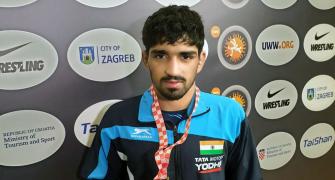Ever imagined a search engine somewhat similar to Google to retrieve results based on an image or a sketch? Just draw a picture of a wing nut, and the engine will search a database and retrieve all the images matching your drawing. Sounds unreal?
Sounds unreal but Purdue University researchers led by an Indian American Professor Karthik Ramani, 1985 product of Indian Institute of Technologies-Madras, are soon going to amaze you with this kind of search engine that will turn your imagination into a reality.
Researchers at Purdue University Research and Education for Information Systems in Engineering (PRECISE) have created the world's first 3D Computer-Aided Design Part Search Engine for use in Product Lifecycle Applications. This will enable people to search huge industry databases by sketching a part from memory, penciling in modifications to an existing part or selecting a part that has a similar shape.
"It's like a special kind of Google that lets you search for parts based on their three-dimensional shapes," says Karthik Ramani, a professor of mechanical engineering and director of the PRECISE.
"Engineers create a number of parts while they design products. The part variety and number has dramatically increased in the past decade owing to the widespread use of Computer-Aided Design software. The system uses a hierarchical representation of the part and new fast graph search methods we have developed, says Prof. Ramani.
At present, searching for images on the Internet remains a text-based activity. General Web search engines, such as Google and AltaVista, do let people sift through millions of images online, but companies base their tools largely on keywords. That means images must be tagged with a handful of descriptive words, or what's known as metadata, to match up with users' keyword queries.
That method can be limited, because many images are not associated with text, and labeling them can be costly. Also, it can be difficult to square users' vocabulary with the relatively few terms associated with a given image. For this reason, stock photo Web sites such as Corbis invest heavily in metadata for images.
But in 10 to 15 years, image searches will likely be taking place on the Internet, according to Ramani. That would take search well beyond its roots in text queries, such as those that Google and Yahoo allow.
"You can search on something that you have in your mind," Ramani says. "A shape has so many details in it."
Professor Ramani's team at Purdue University has made several unique contributions. "It is not just finding a similar part, we actually enable one to search for parts using queries by example, modifying a part, or as simply as sketching a part in 3D."
Although CAD systems have the promise of "reuse" people seldom are able to locate part files in repositories. As a result industry loses a lot of money in not being able to reuse earlier parts. The "wheel is reinvented" many times.
With the help of 3D Part Search, the engineers can use past knowledge, get advice on parts being designed, and even search in 3D part catalogues. In the future, this research will result in a number of applications including e-commerce in design and manufacturing industry.
Besides expanding the range of the shape search engine, researchers are looking at how to perform multimodal searches that combine image elements with text. In other words, someone could submit a sketch with text, stating "like this, but with four holes, not two" to refine the search.
"The shape-search system will allow engineers to cut this time down by as much as 80 percent," Ramani says.
A series of experiments in which people used the system to find parts showed that it has an accuracy of up to 85 per cent.
"We have solved significant problems, but there are remaining challenges," Ramani says.







